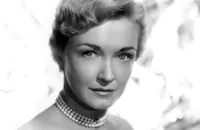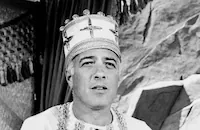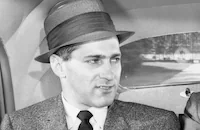Illegal

Brief Synopsis
Cast & Crew
Lewis Allen
Edward G. Robinson
Nina Foch
Hugh Marlowe
Jayne Mansfield
Albert Dekker
Film Details
Technical Specs

Synopsis
In Los Angeles, police arrest Edward Clary for murder, despite his protests that he is innocent. Victor Scott, a highly acclaimed district attorney, prosecutes Clary with evidence gathered by chief investigator Ray Borden and assistant Ellen Miles, who is the daughter of Victor's deceased mentor. In court, jurors carefully chosen by Victor are stirred by his summation and convict Clary. Having won the difficult case, Victor's reputation soars and he makes plans to run for governor. Then, the real killer confesses and Victor is unable to stop Clary's execution in time. Ashamed that his drive to succeed has resulted in an innocent man's death, Victor resigns, drinks heavily and rejects the consolation of Ellen, who loves him although he treats her like a daughter. To discourage Ellen, Victor sends her away and advises her to marry Ray, who has often proposed. Ellen and Ray keep their jobs at the district attorney's office under their new boss, Ralph Ford. Victor opens a private law office, hoping to attract corporate contracts, but former colleagues refuse to refer clients to him. Later, a morally deteriorated Victor slugs a man and is arrested. While awaiting trial, Victor watches the manslaughter hearing of Carter, who struck a man with a lead pipe during a brawl. A diminutive man, Carter claims that he acted in self-defense, when the victim, a drunken prizefighter, beat him repeatedly with his fists. Later, Victor overhears Carter accuse Taylor, the lead witness, of having been knocked unconscious before the deathblow occurred and decides to defend Carter in court. During Carter's trial, the stocky Taylor testifies that he was conscious during the whole brawl and boasts adamantly that no one could knock him out. As Taylor exits the stand, Victor discredits his testimony by knocking the witness unconscious with a swift blow. After winning the case, Victor confides to Ellen that he had a roll of nickels concealed in his fist when he hit Taylor. Ellen sees that Victor's confidence has been restored, and realizes that his self-sufficiency will always stand between them. Impulsively, she announces, to Ray's surprise, that she and Ray are getting married. Later, knowing that Victor has been suppressing his feelings for Ellen, Miss Hinkel, his faithful secretary, scolds him for not marrying Ellen years ago. Short on funds, Victor takes an anxious new client, Parker, who shows up at his office with $60,000 in cash, which is all he has left of $90,000 he embezzled from his employer. In exchange for partial restitution, Victor convinces company head Art Smith not to prosecute. Afterward, Parker and Smith realize that Victor has kept $10,000 as his fee. Angered, Smith reports to Ford that Victor stole the money, but when Victor produces the agreement signed by Smith, Ford admits that he can do nothing. After Smith leaves, Ford rebukes him and Victor argues that his actions were legal and in his client's interest. Later, Andy Garth, a gunman working for mob boss Frank Garland, coerces Victor to accompany him to Garland's expensive apartment. Ray, who is secretly visiting there, leaves by a different entrance to avoid being seen. As blonde piano player Angel O'Hara auditions for Garland's nightclub, Garland shows off his art collection to Victor and explains that Smith's company is one of his legitimate businesses. Although he intended to demand the return of the $10,000, Garland offers Victor a position in his syndicate instead, but Victor refuses, not wanting to be "owned." Later, Victor defends Al Carol, a businessman accused of poisoning his partner. When Ellen warns Victor that the D.A. has the bottle of poison Carol used, Victor asserts the D.A.'s analysis is incomplete. During the trial, Victor drinks from the bottle to prove that it does not contain poison and his theatrics win the case. After cutting short his admirers' congratulations, Victor rushes from the courthouse. Knowing that the poison takes forty-five minutes to take effect, a fact the chemist excluded from the official report, Victor has arranged for a physician to pump his stomach. After the trial, Victor is invited to a victory party, where he learns that Carol is one of Garland's closest associates. When the mobster presents him with $15,000, Victor accepts the money and, implicitly, Garland's job offer. Victor rebuilds his reputation as a successful lawyer, but Ford and other attorneys suspect that he has lost his integrity. Ellen accuses Victor of winning cases through corruption, bribery and dishonesty, and she warns him that Ford knows official information is being leaked to Garland. In an attempt to find the leak's source, Ford tells his employees he plans to arrest one of Garland's minions and assigns men to watch Ellen, whom he suspects is the informer because of her connection to Victor. At home that evening, after sending Ellen on an errand, Ray calls Garland, but finding him unreachable, leaves a message with Angel, who is the mobster's current paramour. Ellen, returning earlier than expected, overhears Ray and realizes he is Garland's accomplice. When Ray tries to push her out the window, she struggles, picks up his gun and shoots him in self-defense. Believing Ellen killed Ray because he discovered her connection to Garland, Ford charges her with first-degree murder. At first, Garland tries to stop Victor from defending Ellen in court, but Victor convinces him that an autonomous lawyer might discover incriminating information. To win the trial swiftly, Victor suggests that Garland order Garth to "confess" and implicate Ray, but Garland refuses, knowing that Garth is untrustworthy. Garth shoots Victor on the way to Ellen's trial, and is then killed by police tailing the attorney. In the courtroom, the gravely wounded Victor calls Angel to the stand and she testifies that Ray called Garland on the night of his death. Satisfied that Ray was the informer and that he has evidence to indict Garland, Ford drops charges against Ellen. The dying Victor collapses to the floor and tells her, "The next time I tell you to marry someone, don't listen to me."

Director

Lewis Allen
Cast

Edward G. Robinson

Nina Foch

Hugh Marlowe

Jayne Mansfield

Albert Dekker

Howard St. John

Ellen Corby

Edward Platt

Jan Merlin

Robert Ellenstein
Jay Adler
Henry Kulky

James Mccallion

Addison Richards
Lawrence Dobkin
Deforest Kelley
Clark Howat
Stuart Nedd
George Ross
John Mckee
Larry Hudson
Kathy Marlowe
Ted Stanhope
Charles Evans
Joseph Hamilton
Gil Warren
Mark Hanna
Dennis King Jr.
Charles Lung
Don Bender

Jonathan Hale
Richard Simmons
John Close
Fred Coby
Marjorie Stapp
Justice Watson
Eleanor Moore
Fred Sherman
Max Wagner
Grandon Rhodes
Charles Hall
John Cliff
Henry Rowland
Alexander Campbell

John Alvin
Herb Vigran
Chris Alcaide
Julie Bennett
Roxanne Arlen
Dee Carroll
Archie Twitchell
Jeanne Andrew
Diane Darrin
John Larch
Baynes Barron
Rankin Mansfield
Charles Meredith
Kit Guard
Pauline Drake
Hal Taggart
John Beradino
Crew
Ed Albert
Wesley Anderson
Fred Applegate
Gordon Bau
W. R. Burnett
Frank J. Collins
Murray Cutter
Stanley Fleischer
Carter Gibson
Ben Goldman
Harry Goldman
Bill Hall
Charles M. Harris
Hontis Burt Jones
Stanley Jones
Mac Julian
Dick Lamarr
Moss Mabry
Charles Mack
J. Peverell Marley
Lloyd Nosler
Pat O'grady
Jackson Parks
Phil Quinn
Thomas Reilly
Leon Roberts
Frank P. Rosenberg
Marguerite Royce
Tillie Starriett
Max Steiner
Henry Villardo
William Wallace
James R. Webb
Eugene Williams
Richard Wilson

Videos
Movie Clip



Trailer
Hosted Intro
Film Details
Technical Specs

Articles
Illegal (1955)
Robinson's character, like William's and Brent's in the earlier films, is a composite of several real-life lawyers, but he is most prominently based on the colorful William J. Fallon, an assistant district attorney in Westchester County who actually did resign his seat in the 1910s because he had convicted an innocent man. He went on to become a defense lawyer and represented drug dealers, embezzlers, pimps and assorted underworld characters including Arnold Rothstein. (Fallon successfully defended Rothstein in court in the 1919 "Black Sox" World Series scandal.) Bill Fallon was as intelligent and charming as he was immoral and self-indulgent, and he was probably best embodied on the big screen by Warren William. Edward G. Robinson still does a fine job, however, single-handedly preventing Illegal from being just an unmemorable urban melodrama.
The mid-1950s were a period of routine B-movie assignments for Robinson. The McCarthy hysteria had led to allegations of Communist affiliation for him, and while he was not blacklisted, the offers for top roles evaporated and he had to make do with minor films like Illegal. Robinson later wrote, "I was doomed, both by age and former political leanings, to a slow graveyard." Finally Cecil B. DeMille came to the rescue and cast him in The Ten Commandments (1956). Robinson was eternally grateful: "Cecil B. DeMille returned me to films. Cecil B. DeMille restored my self-respect."
Robinson turns in a very relaxed performance in Illegal, demonstrating an impressive professionalism and relishing some opportunities to talk tough and act wily. He's a natural while slugging a witness in court (to make a legal point), or drinking poison to make a jury think it's really not poison -- and then when a recess is called, rushing away to get his stomach pumped. Both sequences are based on real incidents, by the way.
Also in the cast are Nina Foch, emanating warmth and sympathy, 35-year-old DeForest Kelley as a condemned man, and sultry 22-year-old Jayne Mansfield as a gangster's moll. Contrary to some opinions, Illegal was not Mansfield's debut film; she had already appeared on screen in Pete Kelly's Blues (1955) and had filmed a small role in Female Jungle, which was shot in 1954 and released in 1956. Illegal was, however, her first substantial role, and she exudes stunning sex appeal while turning in a perfectly serviceable performance. Her next film would be one of her best, Frank Tashlin's The Girl Can't Help It (1956).
Illegal didn't score many points with critics. Variety called it "lackluster... Picture never seems to decide whether it should play itself for straight melodramatics or for hokum laughs."
For a minor film, Illegal boasts a top composer in Max Steiner and also the talented cameraman Pev Marley, a real pro whose credits extended all the way back to 1923's The Ten Commandments.
Some final tidbits: Illegal was produced by Frank Rosenberg, and in one scene, a movie theater marquee touts a coming preview of Miracle in the Rain (1956) -- Rosenberg's next picture! Edward G. Robinson was a famous Impressionist art collector, and several of his paintings -- by Degas, Derain, Gauguin and others -- can be seen here lining the walls of his office or Dekker's home.
Producer: Frank P. Rosenberg
Director: Lewis Allen
Screenplay: W.R. Burnett, James R. Webb (screenplay); Frank J. Collins (story)
Cinematography: J. Peverell Marley
Art Direction: Stanley Fleischer
Music: Max Steiner
Film Editing: Thomas Reilly
Cast: Edward G. Robinson (Victor Scott), Nina Foch (Ellen Miles), Hugh Marlowe (Ray Borden), Jayne Mansfield (Angel O'Hara), Albert Dekker (Frank Garland), Howard St. John (E.A. Smith), Ellen Corby (Miss Hinkel), Edward Platt (Ralph Ford), Jan Merlin (Andy Garth), Robert Ellenstein (Joe Knight).
BW-88m.
by Jeremy Arnold

Illegal (1955)
Quotes
Trivia
Notes
Actor DeForest Kelley's surname is misspelled as "Kelly" in the opening credits. Scenes of the murder of "Edward Clary's" girl friend, and his subsequent arrest are shown without dialogue, in a montage interspersed with opening credits. The death of "Victor Scott" in the last scene, as mentioned in reviews, is not shown explicitly, but is implied. Exteriors of downtown Los Angeles are shown throughout the film.
According to information contained in the file on the film in the Warner Bros. Archive at the University of Southern California Cinema-Television Library, paintings seen in the office of "Frank Garland" were original oil paintings owned by Edward G. Robinson, a well-known art collector. According to Warner Bros. memos, Robinson loaned the studio six paintings, cumulatively valued at over $213,000, for the production. Two of the paintings, Dancers in Repose by Edgar Degas and Tahitian Flowers by Paul Gaugin are shown prominently in scenes set in Garland's office. At one point, Robinson's character, "Victor Scott," comments that he could never afford originals. Two other paintings, which are later shown in Scott's office, included Courtroom in the Country by George Roualt and Beautiful Model by André Derain. Warner Bros. memos also stated that two original paintings by actress Gladys Lloyd, who was then married to Robinson, were also used in the film, but their exact placement within the story has not been determined.
Although their appearance in the film has not been determined, Hollywood Reporter production charts add Phil Arnold, Jack Lomas and Jean Anderson to the cast. Warner Bros. memos indicate that actor James Daly was originally considered for the role of reporter "Joe Knight." Illegal marked the motion picture debut of actress Jayne Mansfield (1933-1967). Warner Bros. script material reveals that Mansfield was to appear in a nightclub scene, where she would sing two new songs, but that sequence was not included in the released film. Script information in the Warner Bros. archives indicate that, initially, the victim in the opening scene was to be shot while taking a bubble bath in a sunken tub but MPAA officials objected.
Warner Bros. had made two previous films based on the Frank J. Collins play: the 1940 production, The Man Who Talked Too Much, which was directed by Vincent Sherman and starred George Brent and Virginia Bruce and the 1932 production The Mouthpiece, directed by James Flood and Elliott Nugent, and starring Warren William (see entries below). As noted in reviews for the 1932 film, the main character was inspired by real-life lawyer William J. Fallon.

Miscellaneous Notes
Released in United States Fall October 1955
A defense lawyer takes on a notorious gangster up on racketeering charges, but soon finds out that much of the mobster's inside info for his successful operations was leaked by the lawyer's own assistant, when the counsel was a District Attorney. Soon, double-crossing and murder start popping up to cover the trail of guilt. murder on his hands, and much of crime boss' inside info on
Released in United States Fall October 1955















